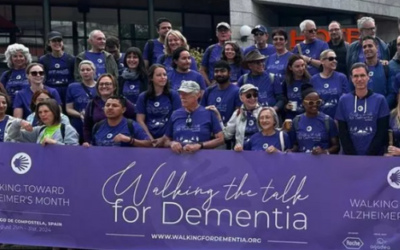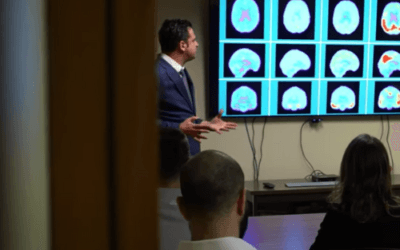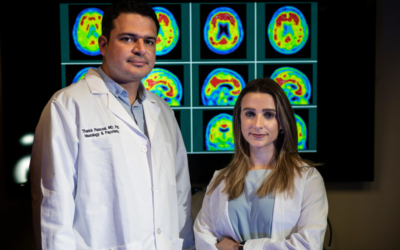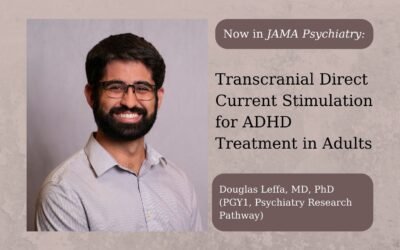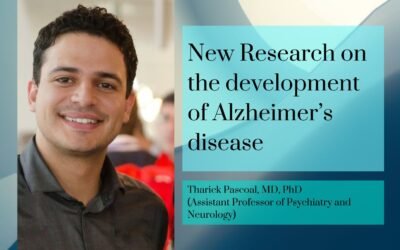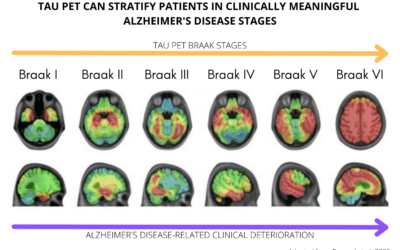Pitt Psychiatry Research Published in Alzheimer’s & Dementia
Pitt Psychiatry investigators have recently published studies in Alzheimer's & Dementia. Below is a summary of recent original research on neural factors underlying cognitive and depressive symptoms in late life, sleep and rest–activity rhythms across...
Three Psychiatry Postdoctoral Research Trainees Receive University of Pittsburgh Postdoctoral Association Awards
Congratulations to Ligia Antezana, PhD; Carolina Soares, PhD; and Lindsay Taraban, PhD, who received Best Poster Presentation Awards at the University of Pittsburgh Postdoctoral Association 2025 Postdoctoral Data & Dine Symposium. Dr....
19 people were honored at Pitt’s Postdoctoral Research Symposium
On April 14, the University of Pittsburgh held its 18th annual Postdoctoral Research Symposium, hosted by the Office of Academic Career Development for the schools of the health sciences. Postdocs presented 115 posters at the event, and 11 of them took home $500...
VJ Dementia with Marina S. Medeiros
Link: https://www.vjdementia.com/speaker/marina-scop-medeiros/
Blood testing for Alzheimer’s could be game changer in early diagnosis
Seven million Americans are living with Alzheimer’s disease. One in three people over the age of 85 deal with it. Early detection is key, so that people can start treatment. But unfortunately, diagnosis can involve expensive procedures like a PET scan or a spinal tap....
UPMC recruiting participants for research study involving blood tests, early Alzheimer’s detection
PITTSBURGH — Research in Sweden shows that when blood tests are quantified in primary care settings, they are more than 90 accurate in identifying the presence of pathological proteins in the brain that are associated with Alzheimer’s Disease, according to a new study...
News about Dr. Pascoal’s participation in WTD
El neurólogo brasileño afincado en Pensilvania Tharick Pascoal es uno de los ochenta peregrinos que, procedentes de 26 países diferentes, participan desde este lunes en la segunda edición de Walking the Talk for Dementia. Una iniciativa que define como...
Pitt Psychiatry’s 2024 Research Day, Part II: 173 Poster Presentations!
Pitt Psychiatry’s 2024 Research Day featured 173 poster presentations from faculty, trainees, and staff. Each poster presenter was visited by one pair of reviewers from among a total of 55 faculty discussants. During the plenary session, Outstanding Poster...
Two Psychiatry Postdoctoral Research Trainees Receive University of Pittsburgh Postdoctoral Association Awards
Congratulations to Cynthia Felix, MD, MPH, and Shalini Sivathasan, PhD, who received Best Poster Presentation Awards at the University of Pittsburgh Postdoctoral Association 2024 Postdoctoral Data & Dine Symposium. Dr. Felix is a postdoctoral associate focusing on...
The HEAD Study – Pascoal Laboratory, University of Pittsburgh
Researchers around the world are collaborating in the largest head-to-head tau PET dataset and harmonization effort ever undertaken. The findings could lead to significant advances in the diagnosis and treatment of Alzheimer's Disease. Drs. Tharick Pascoal (University...
Over the Span of AD, Roles of Astrocytes and Microglia Change
As neuronal supporters and immune surveyors, astrocytes and microglia are no mere bystanders to the neuronal mayhem that unfolds in Alzheimer’s disease. At the AD/PD meeting, held March 5-9 in Lisbon, scientists presented new twists on the relative contributions of...
Investing in Hope
One day a week, when he’s not conducting research on Alzheimer’s disease in his Oakland lab, Dr. Tharick Pascoal treats patients at the memory clinic at UPMC. Sometimes what he observes is startling – a man who was fairly coherent six months ago staring back at him...
Brain Inflammation May Trigger Alzheimer’s-Linked Anger, Anxiety
Alzheimer’s patients are notoriously irritable, agitated and anxious – and researchers now think they know why. Brain inflammation appears to influence the mood problems of Alzheimer’s patients, rather than traditional markers of the disease like amyloid beta or tau...
Irritability, Agitation and Anxiety in Alzheimer’s Patients Caused by Brain Inflammation, Pitt Study Says
Common neuropsychiatric symptoms that doctors see in Alzheimer’s disease patients originate from brain inflammation rather than amyloid and tau proteins, report University of Pittsburgh School of Medicine researchers today in JAMA Network Open. The finding strengthens...
New research could be game-changer for early detection of Alzheimer’s Disease
The Alzheimer's Association says the disease is a growing public health crisis in PA. Major steps are being taken here in Allegheny County, whether it's addressing under-represented communities, or helping with early detection....
Alzheimer’s & Dementia and Nature Aging: New Alzheimer’s Disease Research
The Pascoal Lab (PI: Tharick Pascoal, MD, PhD; Associate Professor of Psychiatry and Neurology) and colleagues have published recent research findings in Alzheimer's & Dementia and Nature Aging examining biomarkers and...
Pittsburgh is at the forefront of research for warning signs of Alzheimer’s disease
Link: https://www.cbsnews.com/pittsburgh/video/pittsburgh-is-at-the-forefront-of-research-for-warning-signs-of-alzheimers-disease
Advancing Against Alzheimer’s
Two older adults check in at the hospital to undergo brain scans. Their results are remarkably similar. Both show an accumulation of amyloid plaques—proteins that clog the spaces between neurons and serve as a telltale sign of Alzheimer’s disease. But, as time...
Finding a Biomarker for Alzheimer’s Disease
In this UPMC Physician Journal feature, meet Tharick Pascoal, MD, PhD, neurologist and associate professor of Neurology and Psychiatry at the University of Pittsburgh School of Medicine, as he and his team conduct research to find a biomarker based on tau proteins in...
Best Life: Researchers link ADHD, alzheimers
More than 6.5 million people are living with Alzheimer’s in the United States. More than six million children have attention-deficit/hyperactivity disorder or ADHD. One is usually diagnosed later in life, and the other is diagnosed earlier, but could the two actually...
Exploring a Connection Between ADHD and Alzheimer’s
New research has shed light on the connection between attention deficit-hyperactivity disorder (ADHD) and Alzheimer’s, two neurological conditions that manifest in very different ways. One study showed that people who are genetically predisposed to ADHD may be...
New Alzheimer’s blood test may determine who is at risk of dementia: ‘Could be game changer’
A blood test may help identify individuals at risk for Alzheimer’s before they show any signs of the disease, according to a new study published in the journal Nature Medicine. The blood test looks at the activity of star-shaped brain cells in the blood...
Brain Cell Biomarker for Preclinical Alzheimer Disease Identified
Astrocytes, cells that are involved in the brain’s support system, might play an important role in the progression of Alzheimer disease, according to results from 1016 participants with and without amyloid-β pathology who were all cognitively unimpaired....
In Amyloid Cascade, Do Reactive Astrocytes Bridge Plaques and Tangles?
Why do some people with amyloid plaques decline, while others do not? In the May 29 Nature Medicine, researchers led by Tharick Pascoal at the University of Pittsburgh laid some of the blame on reactive astrocytes. Among cognitively healthy people with amyloid...
Pitt study could open opportunity for earlier Alzheimer’s detection
PITTSBURGH (KDKA) -- A study by the University of Pittsburgh claims to have found an earlier detection for people who may have Alzheimer's, and it used a test many of us routinely take. Blood tests were used to see if someone could develop the disease or not....
Microglial and Astrocyte Reactivity Are Key to Determining Alzheimer’s Disease Progression
Tharick Pascoal, MD, PhD (Associate Professor of Psychiatry) is an internationally recognized expert on the imaging and fluid biomarkers of Alzheimer’s disease and related dementias. He recently published two papers examining the multifaceted but interactive...
Alzheimer’s blood test edges closer as key brain cell identified
A blood test that can detect people at early risk of Alzheimer’s is a step closer after scientists implicated a key brain cell in the development of the disease. As well as providing the basis for a test, their work points to a resolution of one of the persistent...
New Blood Biomarker Can Predict if Cognitively Healthy Elderly Will Develop Alzheimer’s Disease
PITTSBURGH — Why do some people develop Alzheimer’s disease while others don’t? And, even more puzzlingly, why do many individuals whose brains are chock-full of toxic amyloid aggregates — a telltale sign of Alzheimer’s brain pathology — never go on to develop...
Prick of the bunch: Blood test can predict who’ll develop Alzheimer’s disease, ‘game-changing’ study suggests
Scientists may have found the true cause of Alzheimer's disease — and believe the condition can be detected using a simple blood test. Experts have long known the build-up of amyloid in the brain is linked to the disease, but whether the plaques are a cause...
New Research from Pitt Psychiatry on Alzheimer’s Disease Biomarkers
Department of Psychiatry investigators focused on Alzheimer’s Research—Victor Villemagne, MD (Professor of Psychiatry); Tharick Pascoal, MD, PhD (Associate Professor of Psychiatry and Neurology); and Thomas Karikari, PhD (Assistant Professor...
Microglia Conflicted: To Help, or to Hinder, Tau’s March Across the Brain?
Do microglia thwart neurodegenerative disease, or help it along? Do they keep amyloid in check with one hand, while goading tau entanglement with the other? Do they protect neurons early on in disease, but sour into synaptic slayers later? As the field gears up to...
University of Pittsburgh School of Medicine Promotes Tharick Pascoal, MD, PhD, to Associate Professor of Psychiatry
We are delighted to announce that Tharick Pascoal, MD, PhD, has been promoted to Associate Professor of Psychiatry by the University of Pittsburgh School of Medicine. Dr. Pascoal received his MD from Federal University of Pelotas in Brazil. He...
Genetic risk of ADHD may boost odds of Alzheimer’s in old age
Having a genetic predisposition to attention-deficit/hyperactivity disorder, or ADHD, is associated with cognitive decline and may predict Alzheimer's disease in old age, early research released Thursday suggests. Recent large studies have hinted at a link between...
Transcranial Direct Current Stimulation vs Sham for the Treatment of Inattention in Adults
Attention-deficit/hyperactivity disorder (ADHD) is a neurodevelopmental condition that affects 2.5% of adults worldwide. Pharmacotherapy is the recommended initial treatment for most adults, but patient adherence can be low due to adverse effects and other concerns....
Molecular Psychiatry: Astrocyte Biomarker Signatures of Amyloid-β and Tau Pathologies in Alzheimer’s Disease
In Alzheimer’s disease, reactive astrocytes can play an important role in the pathophysiology of the disease. Amyloid-β and tau tangles—the two main pathological hallmarks of Alzheimer’s disease—are associated with astrocyte reactivity. However, knowledge about...
Pitt Psychiatry Awarded $33.5M NIH Program Project Grant Focused on the Pathological and Clinical Progression of AD
The National Institute on Aging (NIA) has awarded the University of Pittsburgh Department of Psychiatry a Program Project Grant (PPG) renewal for “The role of astrogliosis in aging and the pathological and clinical progression of Alzheimer's disease.” The Alzheimer’s...
Study Challenges Dogma Behind Alzheimer’s Disease Drug Trials
PITTSBURGH - Contrary to early studies, brain levels of enzymes that regulate DNA-folding drop as Alzheimer’s disease progresses, neuroscientists from the University of Pittsburgh, McGill University and Harvard University reported today...
Pitt Psychiatry Faculty Members Invited to Contribute to World Alzheimer Report
In fall 2021, Alzheimer’s Disease International published World Alzheimer Report 2021: Journey though the diagnosis of dementia, a compendium of research on the disease, currently the seventh leading cause of mortality worldwide. The report addresses numerous...
Nature Medicine: Microglial Activation Is Involved in the Spread of Tau Tangles in Alzheimer’s Disease
Investigators including Pitt Psychiatry’s Tharick Pascoal, MD, PhD (Assistant Professor of Psychiatry and Neurology), have published a paper in Nature Medicine investigating the correlation between microglial activation, abnormal tau tangles (a...
Is Inflammation In The Brain Causing Alzheimer’s Disease?
The brain of a person with Alzheimer’s disease has a few hallmark traits. First, a buildup of plaques made of proteins called amyloid beta. Second, are tangles of another protein, called tau, within individual neurons. A third major indicator is inflammation. While...
Brain Tissue Inflammation Drives Alzheimer’s Disease
PITTSBURGH – Neuroinflammation is the key driver of the spread of pathologically misfolded proteins in the brain and causes cognitive impairment in patients with Alzheimer’s disease, researchers from the University of Pittsburgh School of...
Pitt Psychiatry Hosts a Tremendous Research “Half” Day
On June 9, 2021, the Department of Psychiatry held its 2nd virtual Research Day, featuring presentations on health equity research, a speed dat(a)ing session, a keynote address, and honors and awards. The event was billed as a Research “Half” Day, as we hope and...
Pitt Psychiatry Investigators Report New Findings in Alzheimer’s Disease and Dementia & Late-Life Depression Research
Acta Neuropathologica: Plasma P-Tau231, A New Biomarker for Incipient Alzheimer's Disease Pathology Scientists including Tharick Pascoal, MD, PhD (Assistant Professor of Psychiatry and Neurology) from Pitt Psychiatry have published the discovery and...
Cutting-edge Research in Alzheimer’s Disease Biomarkers: Introducing Victor Villemagne and Tharick Pascoal
We are pleased to announce that Victor Villemagne, MD, has joined the faculty as Professor of Psychiatry, and Tharick Pascoal, MD, PhD, has been appointed Assistant Professor of Psychiatry. Dr. Villemagne and Dr. Pascoal are widely recognized experts in...
Modeling Associations Between Pathological Pathways in the Progression of Alzheimer’s Disease Using PET Imaging
Dr. Tharick Pascoal is a clinical neurologist and a post-doctoral fellow at Douglas Hospital, McGill University in Montreal, Canada. Through his research, he aims to develop therapeutic targets for neurodegenerative diseases through the identification of biomarkers of...







